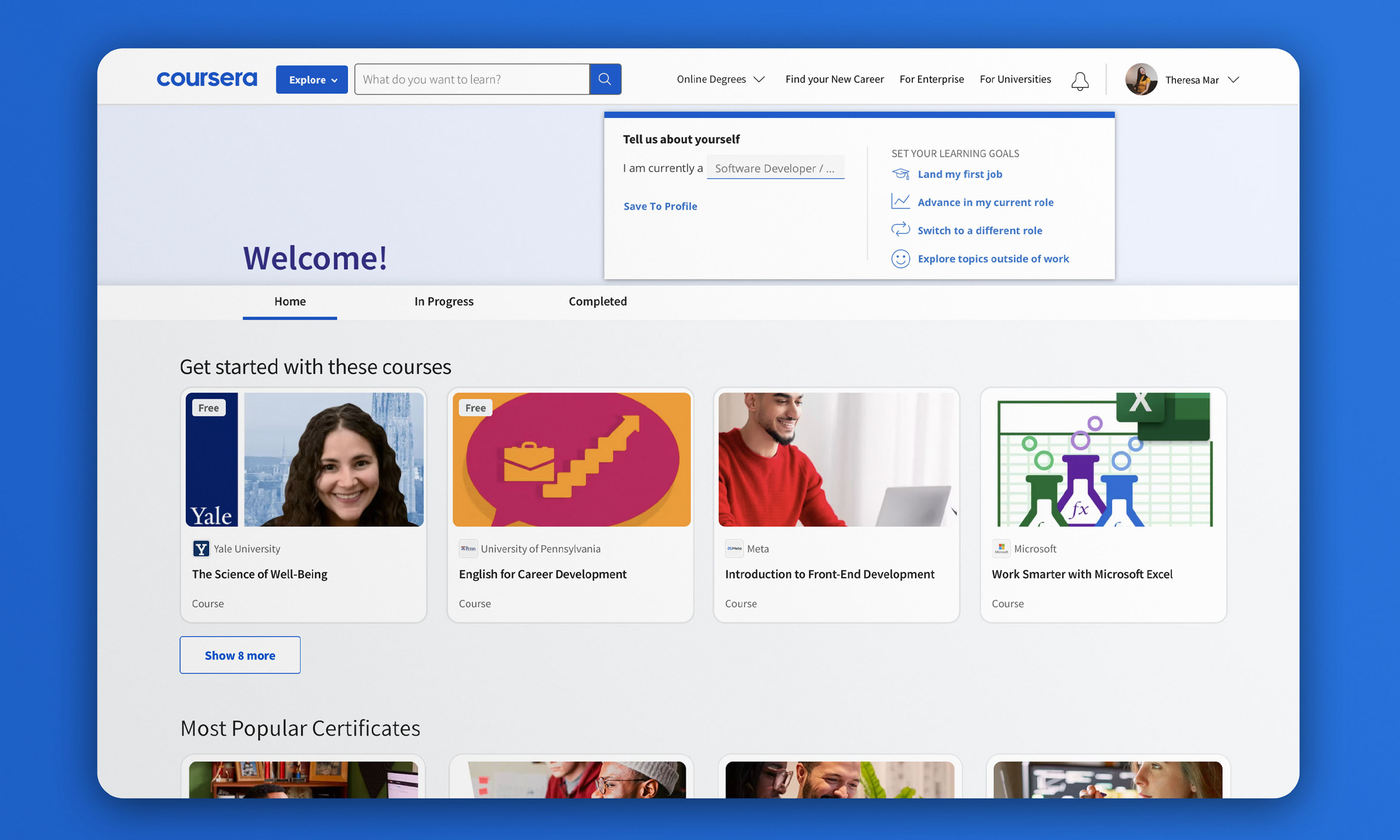Explore 4,000+ Free Online Courses for Personal and Professional Growth
Coursera allows Duke staff, faculty and students to learn new skills or explore interests

Coursera is an online learning platform that provides courses and learning opportunities from companies and universities. Coursera for Duke makes available more than 4,000 of these courses from 120 universities, including Duke, to all Duke staff, faculty and students at no cost. Learners can gain a new skill, explore a new subject or advance their career goals at their own pace.
A pandemic expansion

Course offerings and university partners have expanded in recent years, according to Quentin Ruiz-Esparza, Director of Digital Product Strategy and Design who oversees Coursera programming at Duke.
Pre-pandemic, Coursera at Duke was limited to courses developed by Duke instructors, of which there were approximately 65. But when the world moved more online after 2020, Ruiz-Esparza said Duke became part of Coursera Partners Consortium, a partnership of universities and educational organizations that opted to make their course catalogs freely available to students from other participating institutions.
Among the expanded offerings, Duke instructors now offer about 120 courses, Ruiz-Esparza said. And many departments and units use the tool for training and specialization instruction.
“Coursera is increasingly becoming part of Duke professional schools' and academic units' strategy,” Ruiz-Esparza said. “The online course platform provides affordable, flexible learning at scale that helps Duke achieve its goals for professional and lifelong learning."
Coursera for career development
Computer science and data science courses are among some of the most popular general topics. A sampling of the most popular courses among Duke learners include: Stress First Aid for Health Care Workers, Introduction to Probability and Data with R, Cloud Computing Foundations, Programming for Everybody and Medical Neuroscience.

But there are fun courses, too. Ruiz-Esparza said one of the most popular Duke-offered courses is Dog Emotion and Cognition, taught by Duke Canine Cognition Center’s Brian Hare.
Dean Hawkins has been taking Coursera classes since he started working at Duke three years ago because he was interested in learning more about Python, a computer programming language.
“I don't have any background at all in computer science,” Hawkins said. “I just think computers are kind of neat, and I wanted to learn some programming – and Python is a good way to get started with it. So, I did it for fun and realized that I actually really enjoyed it, and I thought I was good at learning it.”
He said he could get through one long course about every three to four months. His dedication has resulted in 139 total learning hours across 13 unique courses – which are the current highest totals among active Duke learners.
Learning about Python has been instrumental to Hawkins’ career development. Hawkins recently started a position as a Senior Program Coordinator in the Nicholas School of the Environment, a job he found appealing because it involves creating data projects – and using his newfound computer programming skills.
“It's not the same as a degree, but it communicates to future employers that you have initiative, that you're resourceful, and that you can go find answers yourself,” Hawkins said. “It’s a good professional development thing that you could do if you have the time.”
How to sign up for Coursera
Log into https://online.duke.edu/coursera-for-duke/.
Use your NetID to login, then click “enroll” for any of the 4,000-plus courses or specializations in the catalog.
All of the Duke Coursera courses are asynchronous (meaning they can be completed at any time).
While Coursera courses and specializations do not apply toward a degree, many offer a certificate that can illustrate proficiency in a topic or skill and showcased on resumes and LinkedIn profiles.
Send story ideas, shout-outs and photographs through our story idea form or write working@duke.edu.
Follow Working@Duke on X (Twitter), Facebook and Instagram and subscribe on YouTube.